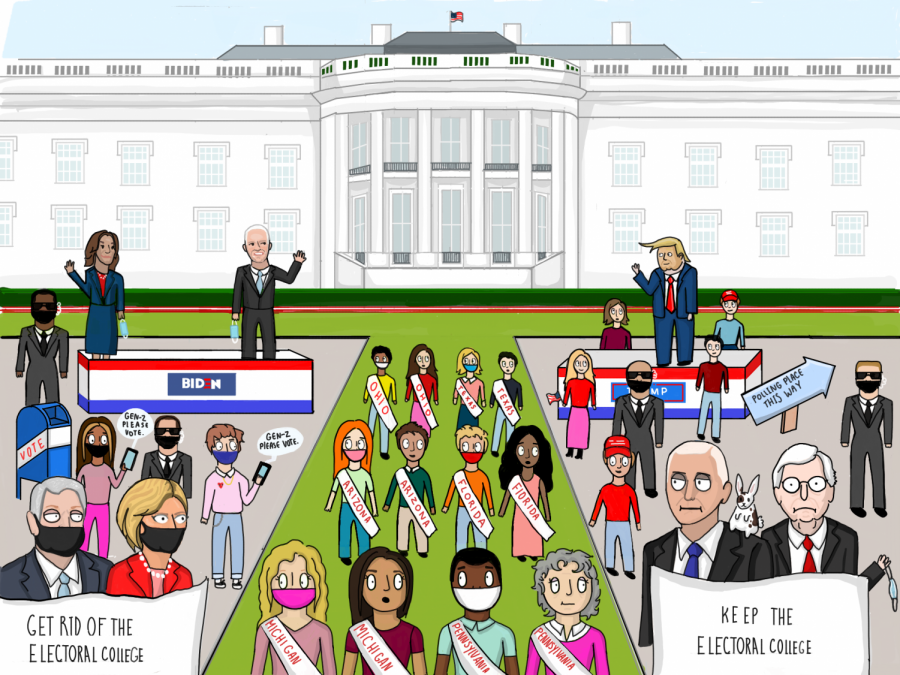Youth engage in democracy
Millions of Gen-Zers become eligible to vote by Nov. 3
With a new election season, the road to the White House becomes increasingly confusing for youth attempting to navigate this complex year. Cartoon by Art Editor Marisa Donovan.
September 25, 2020
With the 2020 election less than 50 days away in a year of chaos and challenge due to the pandemic and racial injustice, Generation Z is stepping up as a new variety of public servants in a new era of change.
“Especially in this time where we need real change on a wide range of topics, we are realizing that it’s time our voices be heard through the democratic system to get what we want,” senior Tara Boyd, who is registered to vote, said. “Our generation is getting more and more educated on politics and the world around us day by day, so I think there is a big push for change.”
With the social movements of the summer and a recent surge in youth activism around the Black Lives Matter movement, projections for youth voter turnout anticipate a motivated Gen Z audience that will engage in a variety of ways this election season.
“Statistics around how young people can participate such as registering others to vote, talk about elections, participating in demonstrations and marches are all higher than we saw in 2016 by far,” Peter de Guzman, CIRCLE Research Program Coordinator, said. “These are really promising signs that young people are ready to express their potential this year.”
Twenty-four percent of poll workers for the 2016 election consisted of workers 71 years old or older and another 32% were between the ages of 61 and 70, according to the U.S. Election Assistance Commission. The current pandemic, however, puts these regular populations of poll workers at risk, leading to a new demand for younger, healthier volunteers to staff the polls.
“Part of the data we’ve seen with a very high trend of young people wanting to become a poll worker is because there’s so much work being done on the ground on campuses and by nonprofits to engage them in the entire process of voting,” Katya Ehresman, chair of the Student Advisory Board for Campus Vote Project, said. “We’re very optimistic about this especially this year, as there’s such a large ask for youth volunteers.”
In the 2016 presidential election, only 46% of women aged 18-25 who were eligible to vote exercised this civic duty, according to the Center for American Women and Politics. As 2020 marks the campaign of the first African American and South Asian American vice-president and with a new cohort of Gen-Zers voting that is politically motivated from the events of the summer, feminism may become a more frontline issue.
“When we look at the intersection of feminism and politics, we’re celebrating the 100th anniversary of a woman’s right to vote this year,” Elaina LeGault, Gender, Power and Ethics teacher said. “Something that is really fascinating at this time is I feel like we’re finally hitting this moment where there is momentum and things are actually changing at a faster pace.”
With the new circumstances of a pandemic-era election, barriers such as the inability to vote at local polling places to protect public health are only one of the roadblocks to becoming more politically active this November.
“Young people’s lives have been very disrupted due to the current times,” De Guzman said. “There is data in our poll that shows that unemployment and other struggles will definitely have an effect on the way they vote. How is voting by mail going to work for young people if their state is adopting that? How are they going to be able to get to the polls? There are promising signs, but a lot of work needs to happen to enable young people to get to the polls.”
Certain communities of undocumented, rural and impoverished youth have always faced access barriers when attempting to vote even before the pandemic.
“At Campus Vote Project, we joke that we hope one day we’re unemployed and there’s no job in student voting that is needed because there are no longer structural barriers that are keeping youth from voting,” Ehresman said. “Right now, we’re making sure that voter registration is accessible so youth know how to register to vote and when elections are on college campuses specifically.”
With roughly 24 million Gen Z-ers eligible to vote, many of whom are inspired by climate change and racial equality, this constituency has the chance to make a large social impact through voting, poll working and advocating this election season.
“I definitely hope there is a bigger turn out for youth voters, but also I hope people educate themselves on a variety of propositions and candidates rather than solely worrying about the president,” Boyd said. “I’ve been waiting for this for my whole life and I feel like it’s a real marker for becoming an adult and an active member in our democratic system.”










